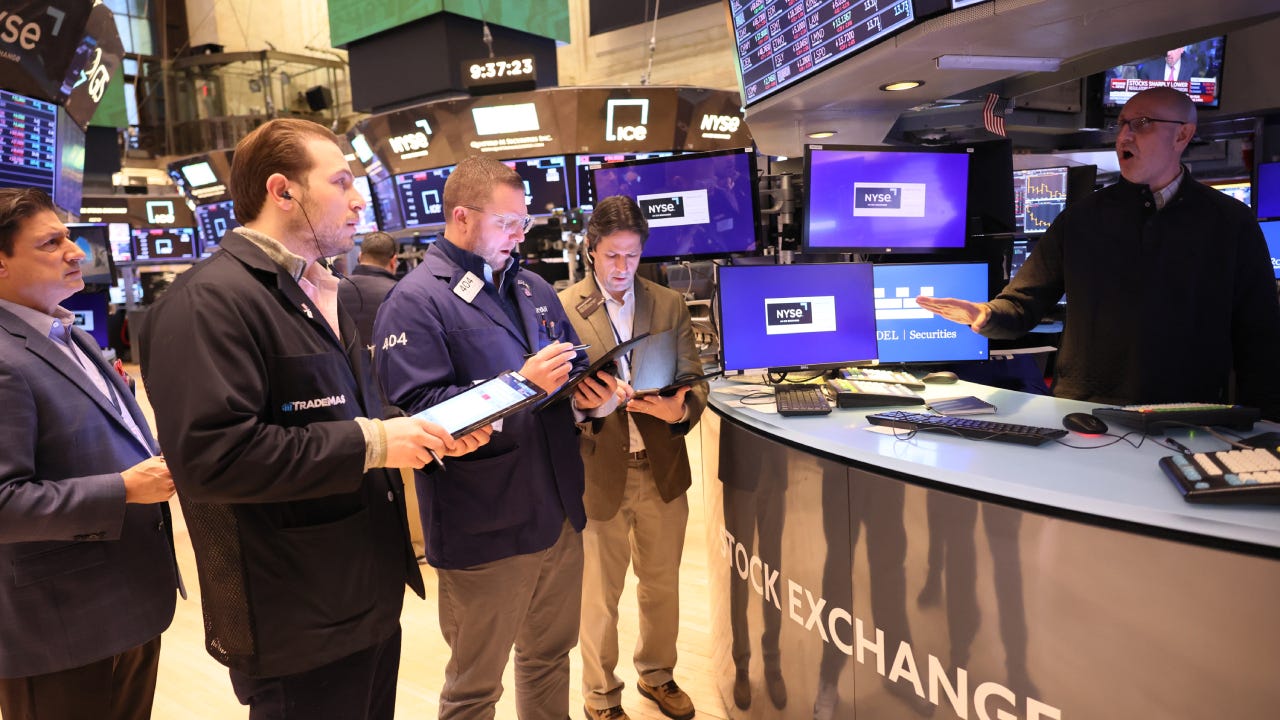Survey: Here are the pros’ top investing ideas and how to handle the Fed’s actions

The Bankrate promise
At Bankrate we strive to help you make smarter financial decisions. While we adhere to strict , this post may contain references to products from our partners. Here's an explanation for .
Stocks have mostly been sidelined since the Federal Reserve announced in late 2021 that it was planning to hike interest rates to combat high inflation. But with the potential end of rising interest rates stocks have rallied and may have found a floor in the last six months. But how should investors position their portfolios until the end of 2023, given what the Fed may do?
Bankrate surveyed investing experts as part of its First-Quarter 2023 Market Mavens survey, asking them what investors should do in light of potential Fed actions and whether long-term investors need to act differently because of possible systemic risk from recent bank failures.
The survey also asked them for their best investing idea for a friend, family member or client, and the top thing people need to know about investing right now.
Forecasts and analysis:
This article is one in a series discussing the results of Bankrate’s First-Quarter 2023 Market Mavens survey:
- Pros foresee stocks rallying 8 percent over the coming year
- Survey: Experts see 10-year Treasury yield below 4% over the next year
- Here are the pros’ top investing ideas and how to handle the Fed’s actions
Here’s how to respond to the Fed’s actions and interest rates
After the Fed raised rates with unprecedented aggressiveness starting in March 2022, investors are now wondering when it will end. High rates helped lead to the failure of some high-profile institutions such as Silicon Valley Bank, and they’ve put pressure on the balance sheets of even well-run banks, causing bond holdings to fall and depositors to seek better yields elsewhere.
For now, the Fed has scaled back that rapid rise in rates, boosting the benchmark rate by just 0.25 percentage points at its most recent meeting in March. The market seems to think the Fed is almost done with hiking rates during this cycle, meaning that a recession could be on the way. But uncertainty is running rampant today, and investors are contemplating how to react.
Here’s how investment analysts say that investors should respond over the coming year.
“The current problems in the banking sector have highlighted the cost to the economy of the Federal Reserve’s quick and dramatic move in Fed Funds rate over the past 12 months,” says Clark A. Kendall, CFA, CFP, president and CEO, Kendall Capital. “The Fed needs to rest and let the economy digest their actions.”
As rates may top soon, several experts pointed to fixed income as a potentially attractive investment, whether shorter term or long term.
“Long-term investors should embrace the bond yields that are presently available,” says Marilyn Cohen, CEO, Envision Capital. “Bond yields are competitive with dividend yields and much, much safer.”
“We would be adding to longer-duration fixed income on increases in yields, to lock in those attractive levels,” says Sameer Samana, senior global market strategist at Wells Fargo Investment Institute.
But advisors caution about buying just any bond, and to balance the yield against the bond’s risk.
“Carefully evaluate duration risk along with yield on your bonds,” says Kenneth Chavis IV, CFP, senior wealth manager at LourdMurray, a wealth management firm located in Los Angeles. “Short to intermediate term Treasurys are paying nicely.”
It still makes sense to invest for the long term and not be too worried about contagion from fallout from the stresses in the financial system, said some respondents.
“We should invest as if the Fed will vanquish systemic risk,” says Charles Lieberman, managing partner and chief investment officer, Advisors Capital Management. “The Fed cannot allow the banking system to fail, so it only makes sense to assume this will be accomplished.”
So for long-term investors, it’s a case of looking for great companies that will thrive for years. And that approach may make it easier to get through the short-term dislocations.
“Long-term investors should continue to look for companies that have positioned themselves for growth over the next five years, regardless of what the Fed does,” says Kim Forrest, chief investment officer and founder, Bokeh Capital Partners.
“Keep your long-term allocations in place, rebalance regularly. Keep calm and carry on,” says Brad McMillan, chief investment officer, Commonwealth Financial Network.
The pros’ best investing idea right now
The Bankrate survey also asked these experts to offer their best investing idea right now and what people need to know about investing. Those answers can be especially valuable as we move toward what looks to be a recession in the near future.
Much of their advice centered around keeping your investing focus on the long term rather than getting caught up in the wave of negative emotion flooding the market. Investors should realize that time can be a key ally when it comes to investing.
“Remember that while episodes of market volatility can be very unsettling, resist the urging to dramatically alter the long-term target mix of your portfolio,” says Dec Mullarkey, managing director, SLC Management. “Sticking with what you determine to be a sensible long-term asset mix, and rebalancing periodically to maintain that mix, has proven to be one of the most reliable portfolio strategies to deliver robust performance over a reasonable investment horizon.”
Proper diversification and portfolio rebalancing are useful during volatile periods, says Chavis. “If possible, add new money when prices are low and for those with taxable accounts, look at strategic tax-loss harvesting,” he says.
Kim Forrest points to the value of having a high allocation to high-quality companies and says that “patience will be rewarded having those stocks.”
“Exploiting the power of time is still the best weapon in an investor’s arsenal,” says Chuck Carlson, CFA, CEO, Horizon Investment Services. “Don’t get caught up in trying to aggressively time the market. Establish a prudent investment allocation and continue to remain invested.”
Other experts offered specific investment picks for investors and those looking to take advantage of the moment, especially in fixed income securities. But one even offered a suggestion for those who know little about investing.
“The best investment opportunity for short-term money is the 2-3 year U.S. Treasury,” says Kendall. “For long-term investors, quality domestic dividend stocks, and because of the extremely strong U.S. dollar, international equities offer great opportunities.”
“Buy a laddered portfolio of U.S. Treasury bonds and/or excellent quality municipal bonds maturing in 3-9 years,” says Cohen. “And do it right now. Historically we get the best bond market rallies off a negative yield curve.”
“If you are not a stock picker, invest in a good quality index via an ETF or a heavily based dividend one,” says Jim Osman, founder, The Edge Group.
The best index funds charge low expenses and have strong track records over time, and you don’t need much investing knowledge to do well in them if you take a buy-and-hold approach.
Methodology
Bankrate’s first-quarter 2023 survey of stock market professionals was conducted from March 17-24 via an online poll. Survey requests were emailed to potential respondents nationwide, and responses were submitted voluntarily via a website. Responding were: Jim Osman, founder, The Edge Group; Louis Navellier, CIO, Navellier & Associates, Inc.; Dec Mullarkey, managing director, SLC Management; Sameer Samana, senior global market strategist, Wells Fargo Investment Institute; Kenneth Chavis IV, CFP, senior wealth manager, LourdMurray; Charles Lieberman, managing partner and chief investment officer, Advisors Capital Management; Marilyn Cohen, CEO, Envision Capital; Kim Forrest, chief investment officer/founder, Bokeh Capital Partners; Hugh Johnson, chief economist, Hugh Johnson Economics; Sam Stovall, chief investment strategist, CFRA Research; Chuck Carlson, CFA, CEO, Horizon Investment Services; Brad McMillan, chief investment officer, Commonwealth Financial Network; Clark A. Kendall, CFA, CFP, president and CEO, Kendall Capital.
Editorial Disclaimer: All investors are advised to conduct their own independent research into investment strategies before making an investment decision. In addition, investors are advised that past investment product performance is no guarantee of future price appreciation.
Related Articles


Survey: Best ways to play falling interest rates, elections and AI, according to investing pros

